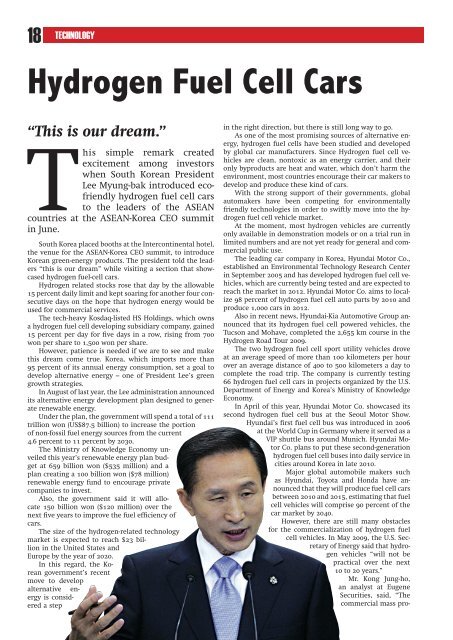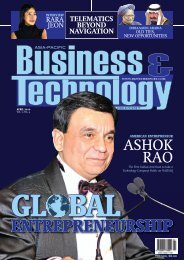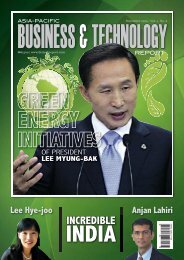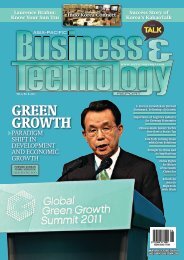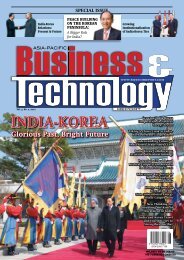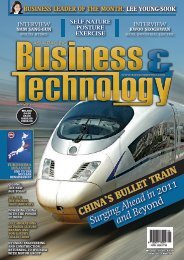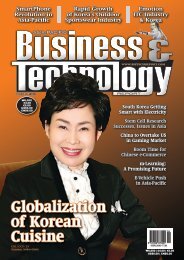AP-2009-07 - Asia-Pacific Business and Technology Report
AP-2009-07 - Asia-Pacific Business and Technology Report
AP-2009-07 - Asia-Pacific Business and Technology Report
- No tags were found...
Create successful ePaper yourself
Turn your PDF publications into a flip-book with our unique Google optimized e-Paper software.
18 technologyHydrogen Fuel Cell Cars“This is our dream.”This simple remark createdexcitement among investorswhen South Korean PresidentLee Myung-bak introduced ecofriendlyhydrogen fuel cell carsto the leaders of the ASEANcountries at the ASEAN-Korea CEO summitin June.South Korea placed booths at the Intercontinental hotel,the venue for the ASEAN-Korea CEO summit, to introduceKorean green-energy products. The president told the leaders“this is our dream” while visiting a section that showcasedhydrogen fuel-cell cars.hydrogen related stocks rose that day by the allowable15 percent daily limit <strong>and</strong> kept soaring for another four consecutivedays on the hope that hydrogen energy would beused for commercial services.The tech-heavy Kosdaq-listed hS holdings, which ownsa hydrogen fuel cell developing subsidiary company, gained15 percent per day for five days in a row, rising from 700won per share to 1,500 won per share.however, patience is needed if we are to see <strong>and</strong> makethis dream come true. Korea, which imports more than95 percent of its annual energy consumption, set a goal todevelop alternative energy – one of President Lee’s greengrowth strategies.In August of last year, the Lee administration announcedits alternative energy development plan designed to generaterenewable energy.Under the plan, the government will spend a total of 111trillion won (US$87.5 billion) to increase the portionof non-fossil fuel energy sources from the current4.6 percent to 11 percent by 2030.The Ministry of Knowledge Economy unveiledthis year’s renewable energy plan budgetat 659 billion won ($535 million) <strong>and</strong> aplan creating a 100 billion won ($78 million)renewable energy fund to encourage privatecompanies to invest.Also, the government said it will allocate150 billion won ($120 million) over thenext five years to improve the fuel efficiency ofcars.The size of the hydrogen-related technologymarket is expected to reach $23 billionin the United States <strong>and</strong>Europe by the year of 2020.In this regard, the Koreangovernment’s recentmove to developalternative energyis considereda stepin the right direction, but there is still long way to go.As one of the most promising sources of alternative energy,hydrogen fuel cells have been studied <strong>and</strong> developedby global car manufacturers. Since hydrogen fuel cell vehiclesare clean, nontoxic as an energy carrier, <strong>and</strong> theironly byproducts are heat <strong>and</strong> water, which don’t harm theenvironment, most countries encourage their car makers todevelop <strong>and</strong> produce these kind of cars.With the strong support of their governments, globalautomakers have been competing for environmentallyfriendly technologies in order to swiftly move into the hydrogenfuel cell vehicle market.At the moment, most hydrogen vehicles are currentlyonly available in demonstration models or on a trial run inlimited numbers <strong>and</strong> are not yet ready for general <strong>and</strong> commercialpublic use.The leading car company in Korea, hyundai Motor Co.,established an Environmental <strong>Technology</strong> Research Centerin September 2005 <strong>and</strong> has developed hydrogen fuel cell vehicles,which are currently being tested <strong>and</strong> are expected toreach the market in 2012. hyundai Motor Co. aims to localize98 percent of hydrogen fuel cell auto parts by 2010 <strong>and</strong>produce 1,000 cars in 2012.Also in recent news, hyundai-Kia Automotive Group announcedthat its hydrogen fuel cell powered vehicles, theTucson <strong>and</strong> Mohave, completed the 2,655 km course in thehydrogen Road Tour <strong>2009</strong>.The two hydrogen fuel cell sport utility vehicles droveat an average speed of more than 100 kilometers per hourover an average distance of 400 to 500 kilometers a day tocomplete the road trip. The company is currently testing66 hydrogen fuel cell cars in projects organized by the U.S.Department of Energy <strong>and</strong> Korea’s Ministry of KnowledgeEconomy.In April of this year, hyundai Motor Co. showcased itssecond hydrogen fuel cell bus at the Seoul Motor Show.hyundai’s first fuel cell bus was introduced in 2006at the World Cup in Germany where it served as aVIP shuttle bus around Munich. hyundai MotorCo. plans to put these second-generationhydrogen fuel cell buses into daily service incities around Korea in late 2010.Major global automobile makers suchas hyundai, Toyota <strong>and</strong> honda have announcedthat they will produce fuel cell carsbetween 2010 <strong>and</strong> 2015, estimating that fuelcell vehicles will comprise 90 percent of thecar market by 2040.however, there are still many obstaclesfor the commercialization of hydrogen fuelcell vehicles. In May <strong>2009</strong>, the U.S. Secretaryof Energy said that hydrogenvehicles “will not bepractical over the next10 to 20 years.”Mr. Kong Jung-ho,an analyst at EugeneSecurities, said, “Thecommercial mass pro-<strong>AP</strong>-2.indd 187/12/09 11:55:37 PM


